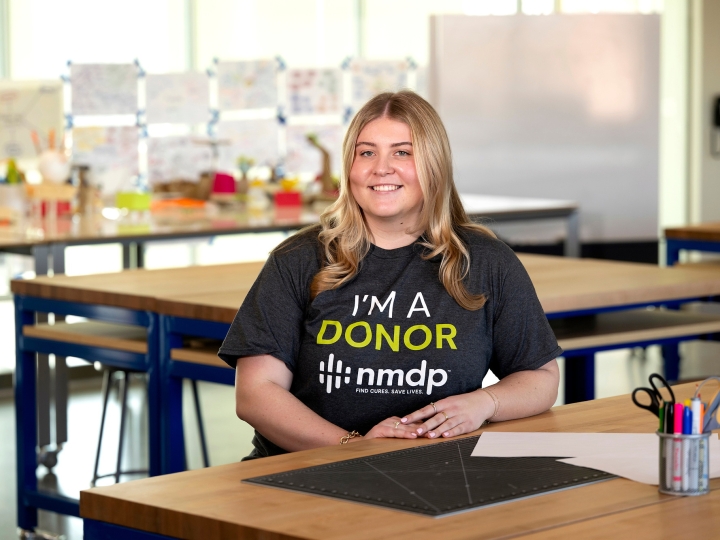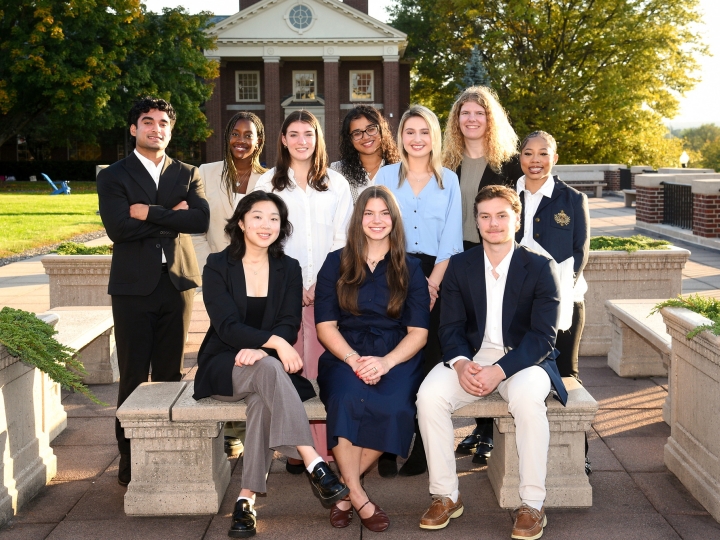Bucknell Sustainability Symposium Looks Forward to the Future
April 14, 2017
High school seniors often have a busy final year, but as one of 21 plaintiffs suing the federal government for its lack of action on climate change, Sophie Kivlehan has more on her plate than most.
"The government is failing all citizens when it comes to climate change, but the younger generations like us are the ones who have the most the lose," Kivlehan said when she spoke at Bucknell's fifth annual Sustainability Symposium on March 30. "The Constitution says all people have the right to life, liberty and property, all of which are threatened in the future. Are young people not 'people'? Does this not apply to us?"
Kivlehan's speech, "Young People's Burden: What Students Can Do to Fight for Their Future," was the keynote address at the symposium, "Generations of Power," held March 30-31.
Kivlehan, of Allentown, Pa., was inspired to join the landmark case in part because of her grandfather, renowned climate scientist James Hansen. However, Kivlehan said, it was her own concerns about climate change and the government's "encouragement of dangerously high carbon dioxide levels" that were the driving force behind her decision.
"Having Sophie as our keynote speaker was particularly relevant considering the lack of focus on these issues throughout the campaign period and now with the new administration," said Jessica Newlin, professor of civil & environmental engineering and interim executive director of the Bucknell Center for Sustainability & the Environment (BCSE), which co-sponsored the symposium. "It is exciting to see passion in young people and I hope that by bringing this message to our students, they will be inspired to fight in their own ways for a sustainable world."
The symposium also was sponsored by Bucknell's Environmental Humanities Working Group, a group of faculty and staff with backgrounds in the humanities who share research and teaching interests in the environment. It is a unique interdisciplinary approach to discussing sustainability, said Claire Campbell, professor of history and member of the group.
"Most discussions about sustainability focus on the natural sciences and the social sciences — metrics and data from the one, policy responses from the other — without considering too much how people think about, understand and relate to the natural world," she said. "So we wanted to consider areas of history and the arts."
To that end, the symposium included "The Creation of Anthracite Fields," an interview with composer Julia Wolfe conducted by Professor G.C. Waldrep, English and Professor Beth Willer, music, Bucknell's director of choral activities. The Pulitzer Prize-winning oratorio was inspired by the history of coal mining and the lives of coal miners.
The symposium also featured "Generations of Power: Student Works," which included recent student pieces from a wide range of disciplines. Oral presentations, poetry readings, research posters and more served to highlight the interdisciplinarity of sustainability in academics at Bucknell.
Other events in the two-day symposium included "Present to Future: Pennsylvania's Anthracite Coal Region." The panel discussion about the future possibilities for coal-producing areas of the state was moderated by Shaunna Barnhart, director of the Place Studies Program of the BCSE and featured Carol Parenzan of the Middle Susquehanna Riverkeeper Association Inc., a nonprofit group that seeks to monitor and enforce clean water laws for the Middle Susquehanna River Watershed area; Maureen Hauck of the University's Small Business Development Center; and Kathy Jeremiah, Anthracite Outdoor Adventure Area Project Coordinator at the Northumberland County Planning Department.
Also part of the symposium was the faculty panel discussion "Generations of Power: Reflecting on the Spirit and Legacy of the Brundtland Commission after 30 years," moderated by Professor Emma Gaalaas Mullaney, international relations and featuring Professor Marcellus Andrews, economics; Professor Peter Jansson, electrical engineering; Professor Andrew Stuhl, environmental studies; and Professor Amanda Wooden, environmental studies. The discussion examined the lasting effects of the United Nations-backed Brundtland Commission report, which was issued in 1987 and was one of the first global efforts to both define "sustainable development" and determine how to implement it.
Sustainability at Bucknell
The symposium closed with the first public forum for Bucknell's President's Sustainability Council, the team responsible for developing and implementing the University's Sustainability Plan.
"I'm proud to be holding this forum and explaining how our council works to implement sustainability across the University," said President John Bravman. "Ways to do things like reduce emissions effectively or find a long-term sustainability plan don't happen overnight, but as a community, Bucknell is more than up to the task."
Ken Ogawa, associate vice president for facilities, started the forum with a presentation about how Bucknell is taking steps to achieve its long-term sustainability goals. The Council's formal charge calls for ongoing calculation and public sharing of its carbon footprint and to meet carbon reduction goals by tracking progress, taking recommended actions and implementing necessary steps.
The University has made significant strides. Nine buildings on campus have earned Leadership in Energy and Environmental Design (LEED) certification, with another two awaiting certification. Dining halls have eliminated the use of trays, which encourages taking less food and has reduced food waste on campus. All yard waste, like fallen leaves and branches, is recycled into mulch that is used on campus.
These large-scale projects combined with smaller changes — like changing light fixtures to energy-efficient models and installing motion sensors in offices and classrooms that lower temperature when unoccupied — have had a significant impact on Bucknell's overall carbon footprint, Ogawa said, lowering its carbon emissions by 7.9 percent since 2007.
These successes are signs that sustainability efforts are moving forward at Bucknell, but as with any long-term process, those involved know that it won't happen overnight. Still, students like Nir Aish '18, a student member of the President's Sustainability Council, are optimistic.
"It's a work in progress, but we are headed in the right direction," Aish said. "As the council continues its work, I hope students, faculty and staff from different fields and departments will have more opportunities to collaborate and eventually make our sustainable goals a reality."

